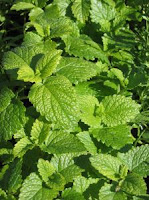
I love herbs that grow prolifically and lemon balm (Melissa officinalis) is one of those. Its in the mint family which explains why it grows so well. Here are some of the other properties I like about lemon balm:
1. Melissa is a great herb to decrease stress and anxiety. It is a mild sedative that promotes sleep. One study found that volunteers who sucked on a lozenge containing lavender oil, extracts from hops, lemon balm and oat showed changes in their EEG that were indicative of relaxation. These changes were similar to those seen in patients taking tranquilizers (1). Another study found that a supplement containing a combination of Melissa officinalis and Valeriana officinalis was able to decrease anxiety in the test participants (2). These results support its uses as a sleep aid, to reduce nervous tension, to reduce infant colic as well as gastrointestinal complaints.
2. Lemon balm has antiviral activity, particularly against the herpes virus (HSV) that causes cold sores. I get cold sores from the stress that I forget to treat with lemon balm. Aqueous (water) extracts of lemon balm inhibit the HSV-1, HSV-2 as well as HSV that is resistant to a popular antiviral drug, acyclovir. This activity is aimed at inhibiting absorption of the virus to cells rather than viral replication which allows it to be effective topically (3,4). Because it is the aqueous extract that works best, it can be used as a simple tea that can be both drank and applied directly to the lips. However, I also find oil based extracts used in a lip balm is also effective. In Germany lemon balm is widely used as a treatment for herpes and cold sores. Studies have found that a cream containing lemon balm can prevent recurrence of cold sores, interrupt the progression of cold sores as well as promote healing (5). Extracts from lemon balm also have antibacterial and antifungal activity (6).
3. Lemon balm is a good source of antioxidants. Water extracts of lemon balm contain phenolic compounds such as hydroxycinnamic acids, rosmarinic acid, chlorogenic acid, ferulic acid and caffeic acids as well as flavonoids (7). Some flavonoids that have been identified in lemon balm include luteolin, luteolin 7-O-beta-D-glucopyranoside, apigenin 7-O-beta-D-glucopyranoside, luteolin 7-O-beta-D-glucuronopyranoside, luteolin 3′-O-beta-D-glucuronopyranoside and luteolin 7-O-beta-D-glucopyranoside-3′-O-beta-D-glucuronopyranoside (8). The internal benefits of antioxidants and flavonoids on the body are well established and so won’t be discussed here, but their benefits to the skin are less well known. Flavonoids have the ability to absorb UV light and so can play a role in protecting the skin against UV damage. One study found that extracts from Melissa were able to decrease the amount of lipid oxidation caused by UV irradiation (9). This is especially important due to the high lipid content of skin and its protective role in preventing moisture loss. I suspect we may be seeing more botanical extracts such as Melissa in our skin care products in the near future.
4. Lemon balm helps improve memory so by consuming it you are better able to remember its previous three benefits. Several studies have found Melissa extracts to improve demented states including Alzheimer’s Disease. In one study, patients with Alzheimer’s Disease who took 60 drops per day of a Melissa extract showed improved cognition after 4 months (10). Dementias such as Alzheimer’s can be associated with agitation, aggression, depression, delusions, wandering, sleep disturbance and hallucinations as well as memory loss. Several of these conditions may be helped with Melissa. A study from the UK, involving severely demented patients, found that rubbing a lotion containing Melissa essential on the hands daily affected several indices tested including decreased agitation and better quality of life (11). Another study, again from the UK found that volunteers taking 1600 mg capsules of dried Melissa leaf had increased memory performance and increased calmness compared to controls (12). The effects of Melissa apparently are due to its ability to increase the activity of acetylcholine, an important neurotransmitter in the nervous system.
These effects on memory combined with its anti-anxiolytic effects also make lemon balm a mood lifter and it can be used for mild depression. The benefits of lemon balm are probably best attained by using it as a tea. I like to blend a little lemon balm with green tea for an afternoon break. Taking some lemon balm at this time of the day better prepares me for the more stressful time of day when my concerns focus on children and preparing a meal. Even though lemon balm tea is best fresh, dried lemon balm is also fine for winter use.
Try these Colorado Aromatics products with Lemon Balm:
Herbal Relief Lip Balm with Lemon Balm
Oasis Spray on Lotion w Lemon Balm
Lemon Balm Face and Body Mist (Hydrosol)
References:
1. Dimpfel W, Pischel I, Lehnfeld R. Effects of lozenge containing lavender oil, extracts from hops, lemon balm and oat on electrical brain activity of volunteers. Eur J Med Res. 2004, 9:423-31.
2. Kennedy, D. O., Little, W., Haskell, C. F., Scholey, A. B., Anxiolytic effects of a combination of Melissa officinalis and Valeriana officinalis during laboratory induced stress. Phytother. Res. 2006, 20:96-102.
3. Nolkemper S, Reichling J, Stintzing FC, Carle R, Schnitzler P.Antiviral Effect of Aqueous Extracts from Species of the Lamiaceae Family against Herpes simplex Virus Type 1 and Type 2 in vitro. Planta Med. 2006 Nov 7;
4. Dimitrova Z, Dimov B, Manolova N, et al. Antiherpes effect of Melissa officinalis L. extracts. Acta Microbiol Bulg. 1993;29:65–72.
5. Mazzanti G, Battinelli L, Pompeo C, et al. Inhibitory activity of Melissa officinalis L. extract on Herpes simplex virus type 2 replication.Nat Prod Res. 2008;22(16):1433-40.
6. Mimica-Dukic, N., Bozin, B., Sokovic, M., Simin, N., Antimicrobial and antioxidant activities of Melissa officinalis L. (Lamiaceae) essential oil. J Agric Food Chem. 2004, 52(9):2485-9.
7. Dr. Dukes Phytochemical and Ethnobotanical Database, www.ars-grin.gov/duke/
8. Patora J., Klimek, B. Flavonoids from lemon balm (Melissa officinalis L., Lamiaceae). Acta Pol. Pharm. 2002 59:139-143.
9. Trommer, H., Neubert, R.H.H., Screening for new antioxidative compounds for topical administration using skin lipid model systems. J. Pharm. Pharmaceut. Sci. 2005; 8:494-506.
10. Akhondzadeh, S., Noroozian, M., Mohammadi, M., et al., Melissa officinalis extract in the treatment of patients with mild to moderate Alzheimer’s disease: a double blind, randomized, placebo controlled trial. J. Neurology Neurosurgery and Psychiatry. 2003; 74:863-866.
11. Ballard CG, O’Brien JT, Reichelt K, Perry EK. Aromatherapy as a safe and effective treatment for the management of agitation in severe dementia: the results of a double-blind, placebo-controlled trial with Melissa. J Clin Psychiatry. 2002 Jul;63(7):553-8.
12. Kennedy DO, Wake G, Savelev S, et al. Modulation of Mood and Cognitive Performance Following Acute Administration of Single Doses of Melissa Officinalis (Lemon Balm) with Human CNS Nicotinic and Muscarinic Receptor-Binding Properties. Neuropsychopharmacology 2003; 28:1871-1881.


So informative! Great post =)
Cindy, thank you so much for writing this! I have tons of lemon balm and I get shingles on my face from time to time. When you say that fresh is best, but dry is fine for the winter – is that pertaining just to the tea? Or could I infuse an oil with dry lemon balm to use on my next shingles outbreak should it occur before spring?
Also – I find Melissa to be a bit harsh or bitter in a tea. What are your experiences?
Thanks again!
Marnie
I love this article because everything was being discussed. I used this sometimes because I have an insomnia which its really hard for me to sleep early. I almost sleep around 5-6am and then I got a work at 8, I almost lost much weight because of having not enough time of sleep. This herb is a very helpful remedy for me. You can also try lemon balm antioxidants.
Marnie, I think lemon balm by itself in a tea can be a bit bitter. I like to combine it with lemon verbena and green tea.
add some passion fruit flower to help with sleep. I make a tea with lemon balm, rosemary and mint and that makes me sleep all night and when I get up I feel good and rested. I make a big jar and I drink everyday.
Sleep well ladies….and thanks Dr. Cindy for all the info.
Rosi